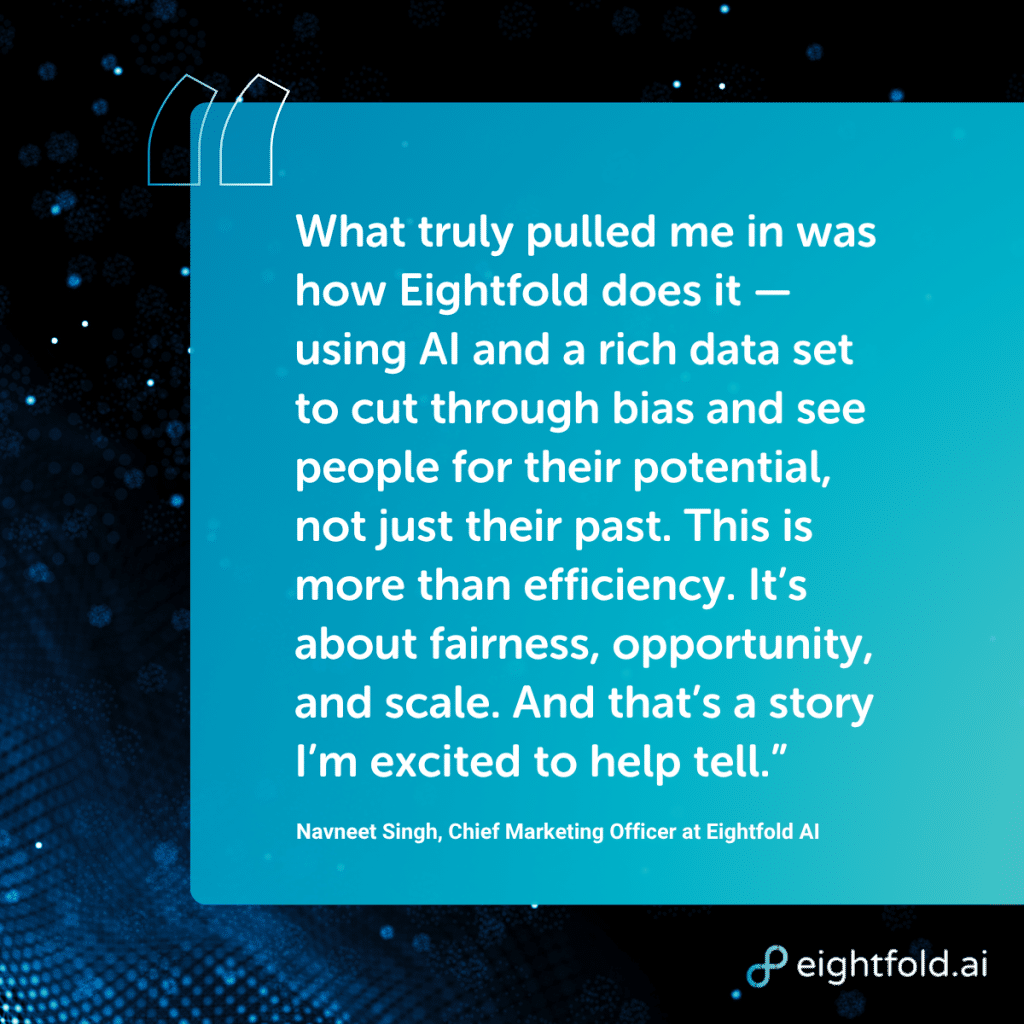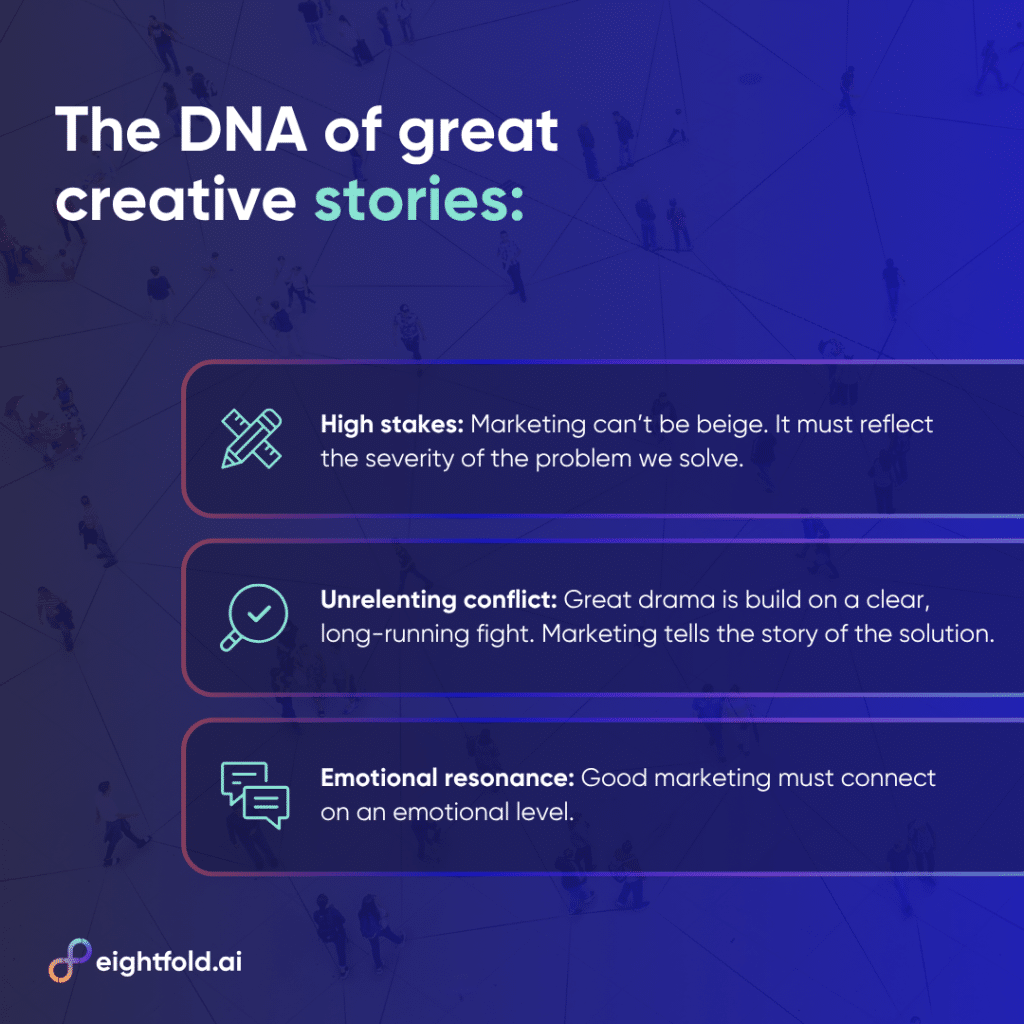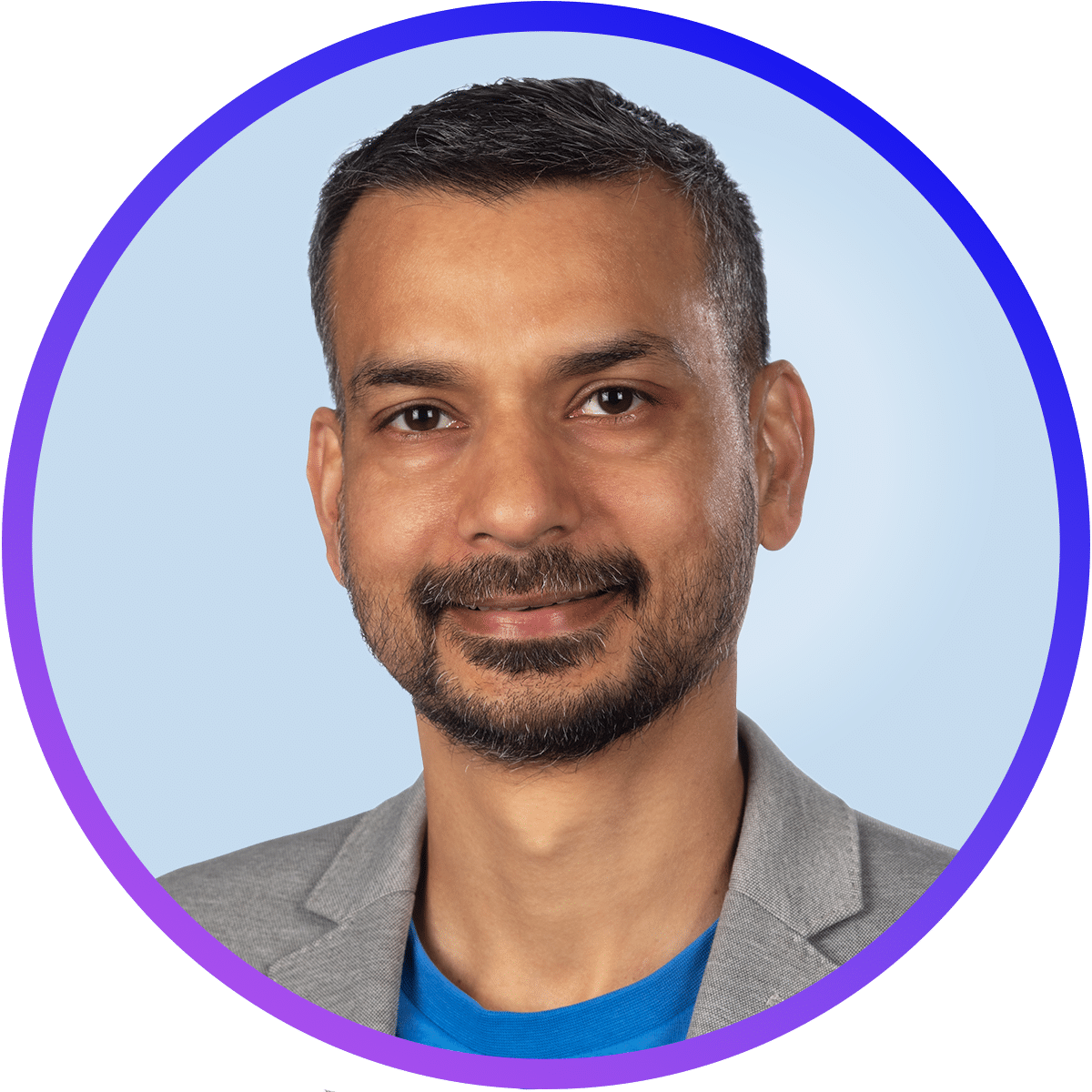The best marketing doesn’t feel like marketing at all. It’s based on truth and delivered with clarity and conviction. It’s the kind of communication that makes you sit up and pay attention — not because you’re being sold to, but because you recognize that there’s something real in the story being told.
That’s the energy Navneet Singh brings to Eightfold as our new Chief Marketing Officer. With a career spent bridging the worlds of cutting-edge technology and human-centered storytelling, Singh has helped build multiple businesses from zero to over $100 million in bookings through narratives rooted in genuine impact.
Singh was drawn to our company for our mission: helping people find the right career path in a world that too often sees them only for where they’ve been, not where they could go. As a parent watching his own children navigate their futures, Singh understands firsthand how defining — and daunting — that career journey can be.
In this conversation, Singh shares his vision for our story, the lessons he’s carrying forward from companies like Palo Alto Networks, and why he believes the next era of B2B marketing demands both precision and soul. Whether he’s drawing parallels between Breaking Bad and enterprise decision-making, or explaining why AI gives him hope for marketing’s future, one thing becomes clear: we’re just getting started.

How did you learn about Eightfold? What attracted you to the CMO role and our company’s capabilities to truly see everyone’s potential and pair them with the right opportunities?
I first heard about Eightfold from [CEO and Co-founder] Ashu[tosh] Garg, and what struck me wasn’t just the tech or the market, but the mission: to help everyone find the right career. That’s deeply personal. As a parent with a daughter in high school and a son in college, I see firsthand how defining and daunting that journey can be.
What truly pulled me in was how Eightfold does it — using AI and a rich data set to cut through bias and see people for their potential, not just their past. This is more than efficiency. It’s about fairness, opportunity, and scale. And that’s a story I’m excited to help tell.
Your background includes both deep technical expertise and storytelling. How do you bridge those two worlds when shaping a company’s brand narrative?
The best stories start with a solid foundation, and that foundation is truth. My technical background ensures our narrative is rooted in something unshakable: our AI isn’t marketing spin — it’s real innovation. That’s what earns credibility with a CIO.
But storytelling is how that truth becomes meaningful. It’s not about saying “deep-learning” — it’s about showing how it removes bias and opens doors for millions. My role is to connect logic to emotion, code to impact, so the CHRO feels the possibility, and the hiring manager sees a better way.
At the end of the day, the customer is the hero. Our job is to be the trusted guide with a story that’s real, human, and powerful.

On the storytelling note, you’ve mentioned some of your favorite films and television shows — “Game of Thrones,” “Breaking Bad,” “The Sound of Music.” What about these stories inspires you? What can B2B marketers learn and aspire to from this type of creative storytelling?
The greatest creative stories share a critical DNA with the greatest brands. They master high stakes, conflict, and transformation.
- High stakes (“Breaking Bad”): The show was about extreme, life-altering choices. In B2B, the stakes are just as high. A CHRO choosing a platform is betting their career, the company’s future talent pipeline, and the livelihoods of thousands of employees. Our marketing can’t be beige; it must reflect the severity of the problem we solve. We need to make our mission feel like a critical, transformative choice.
- Unrelenting conflict (“Game of Thrones”): Great drama is built on a clear, long-running fight. In the enterprise, the battle is for talent. The core conflict is the tension between human potential (what people could be) and legacy systems (which only see what people were). Our story positions us as the category-defining weapon that solves that central conflict.
- Emotional resonance (“The Sound of Music”): This is enduring because it’s about human joy and resilience. One of my mentors used to say there’s no B2B marketing: it’s B2Human. We must connect on an emotional level: the relief a recruiter feels, the empowerment a manager gains. We are selling human transformation, powered by AI.
B2B marketers need to stop selling features and start selling epic transformation. We must raise the emotional stakes and position our product not as a tool, but as the catalyst for the customer’s journey.
You’ve worked with some of the most innovative tech companies in the world. What lessons from those experiences are you bringing to Eightfold? How do you envision bridging the worlds of AI-native HR tech and people?
At Palo Alto Networks, I saw what happens when you pair cutting-edge technology with a clear, urgent mission: people rally, markets move, and customers lean in. That lesson stays with me. Great tech doesn’t just need explanation — it needs belief.
What excites me about Eightfold is that we’re not just building AI for HR — we’re building it for people. For careers. For futures.
The challenge is to keep the soul in the story — to make sure we never lose sight of the human impact behind the algorithm. That’s the bridge: helping the world see that AI can open doors, not just automate tasks. My job is to make sure that message lands, not just in minds but in hearts.
How do you think the role of marketing in B2B SaaS is evolving in an era where AI is reshaping every part of business?
AI has changed the game. It’s not just changing what we market. It’s transforming how we do it — how we find insight, how we create, how we move. In this world, the brands that win won’t just be the loudest. They’ll be the ones people trust, remember, and feel something about.
The role of marketing now is to be both deeply human and unmistakably intelligent. We have to bring precision and resonance. And we have to move fast because in this new world, attention is earned in seconds, and lost just as quickly.
Looking back, what moment or project in your career are you most proud of and why?
I’m most proud of helping grow multiple businesses from zero to $100 million+ in bookings — not just for the number, but for the journey it took to get there.
That meant breaking into unfamiliar territory: securing factory floors and hospital systems, expanding from cybersecurity into digital experience, speaking to entirely new buyers. We had to rewrite our story — make it personal, make it land — then train teams, face resistance, and keep pushing until the market moved with us. There were setbacks, but we learned fast, stayed close to the customer, and kept showing up.
That resilience — and the belief that great ideas deserve great execution — is what I’m bringing to Eightfold. Because we’re not just selling software. We’re building something that can change lives, and that demands our best.
What areas will you focus on first in the coming months? Are there particular areas where you’re especially excited to make a difference?
My first priority is messaging. We need a clear, consistent, and compelling story — one that every person at Eightfold can tell with conviction, whether they’re talking to a customer, a prospect, an investor, or a future teammate.
My team’s immediate priority is based on this fundamental truth: Eightfold is an AI company transforming talent. Our messaging must reflect this truth unambiguously.
In this AI age, timelines are short, expectations are high, and differentiation is everything. We don’t have the luxury of slow iteration. We need a message that stands out — and spreads fast.
Once we land that story, we’ll bring it to life — on social, on our website, through our events, and in every customer touchpoint. From there, I’ll turn my focus to demand gen and how we partner deeply with our sales team to drive high-quality pipeline and deliver on our growth goals.
Related content: Learn more about our partnership with Viven AI and how we’re already using Digital Twins.
We recently announced our partnership with Viven AI, creator of Digital Twins. What makes Digital Twins an exciting new development in the world of HR?
The first wave of AI gave us answers. The next wave will take action. That’s the leap we’re making with Digital Twins.
Text-based AI, like ChatGPT, has already reshaped how we work, but what’s coming next is exponentially more powerful: AI agents that don’t just respond, they do. That’s what makes our partnership with Viven so exciting.
With Digital Twins, we’re moving into a world where AI can prep you for a meeting, reach out to colleagues, and follow up on tasks — even when you’re not in the room. They work with you, for you. And that opens the door to entirely new workflows and possibilities for our customers.
We believe agentic AI will define the next era of work, and we’re building it now. With partners like Viven and our other innovations like the AI Interviewer, we’re not just imagining the future of talent. We’re creating it.
How do you see AI changing the marketing landscape in the coming years? How are traditional roles and functions going to be transformed by AI capabilities, and what should marketers be thinking about in terms of future-proofing their careers?
AI isn’t just changing marketing — it’s rewriting the rules. The way we create, test, launch, and learn is about to accelerate like never before.
Creative cycles will shrink from weeks to hours. The line between performance marketing and brand marketing will blur, because AI will help us tell the right story to the right person at the right moment — at scale.
The next era belongs to marketers who know how to orchestrate — who can connect data, story, tech, and human intuition into something that moves people.
If you’re a marketer today, future-proofing means staying curious, being adaptable, and embracing the creative edge AI gives you, not fearing it. The fundamentals still matter — storytelling, positioning, customer empathy — but the way we apply them will look totally different.
What gives you hope about the future of marketing with AI?
What gives me hope is that AI can bring us back to what marketing was always meant to be: deeply human.
For too long, marketing has been buried under process — endless cycles of production, chasing KPIs, disconnected data. AI is stripping that away. It’s giving us back time, insight, and creativity. It’s letting us move faster but also connect deeper.
The hope isn’t just in what we can automate. It’s in what we can now imagine. AI is giving every marketer the ability to test bold ideas, personalize at scale, and listen to the market in real time — without needing a giant team or a massive budget.
But more than anything, I’m hopeful because this shift isn’t just technological. It’s generational. We’re entering a moment where brand, product, and community are converging — and AI is the catalyst that will help us tell stories that matter.
For fun, where will we find you during your down time outside of work?
I’m a nature enthusiast at heart. Every year, I try to hit the road and explore somewhere new. So far, the mountains and lakes of the Yukon, Alberta, Montana, and British Columbia have been hard to top. And underwater? The reefs of Mexico and the Florida Keys absolutely blew me away.
When I’m not off the grid, you’ll probably find me in the high school bleachers, cheering my heart out for my daughter’s marching band or out at a local birding spot, binoculars in hand, geeking out over a rare sighting.
Great stories demand great execution. Book a demo and see how Eightfold is helping organizations move from legacy systems to AI-powered talent intelligence that opens doors instead of closing them.
